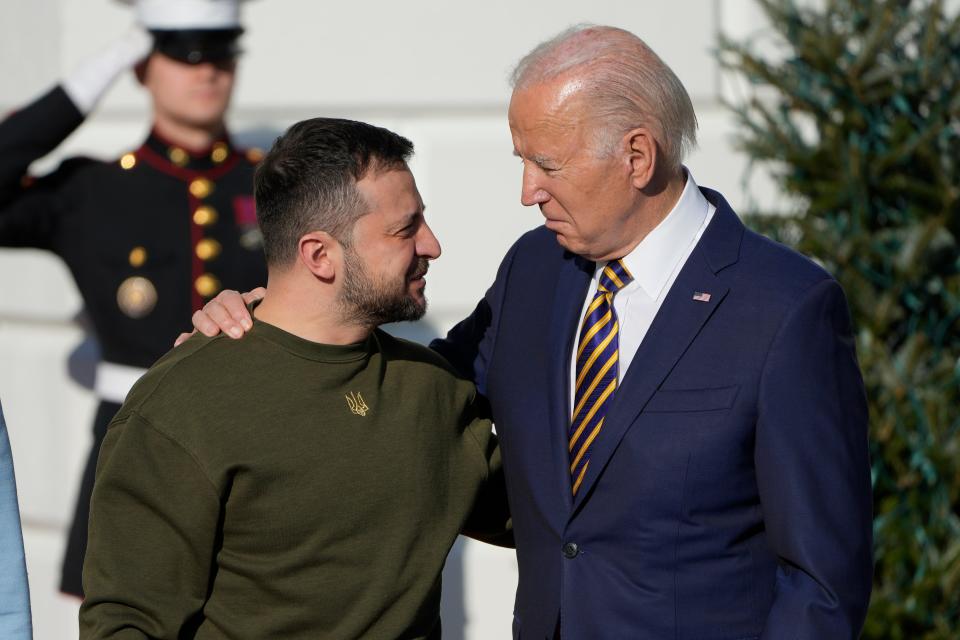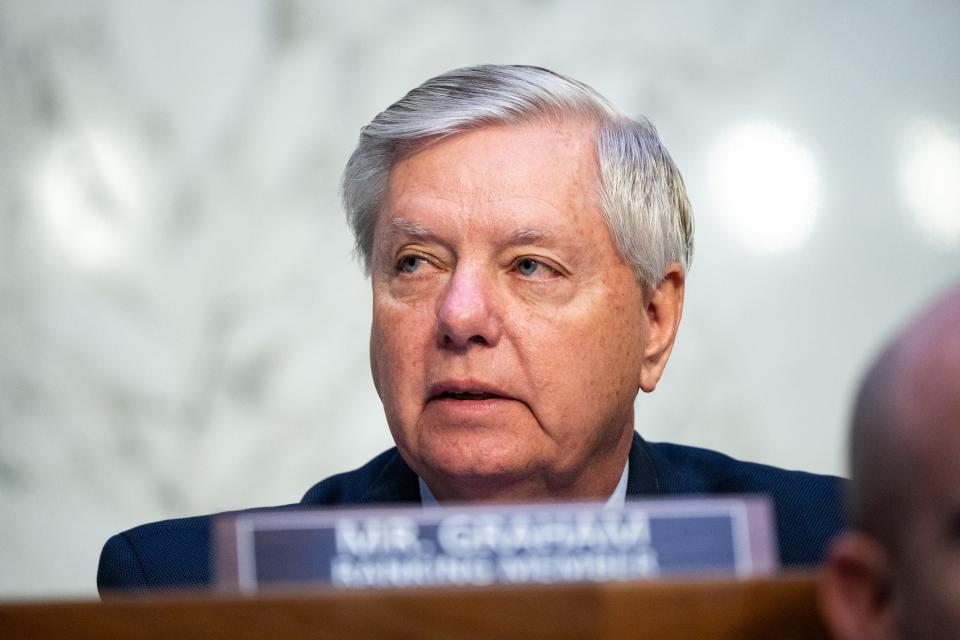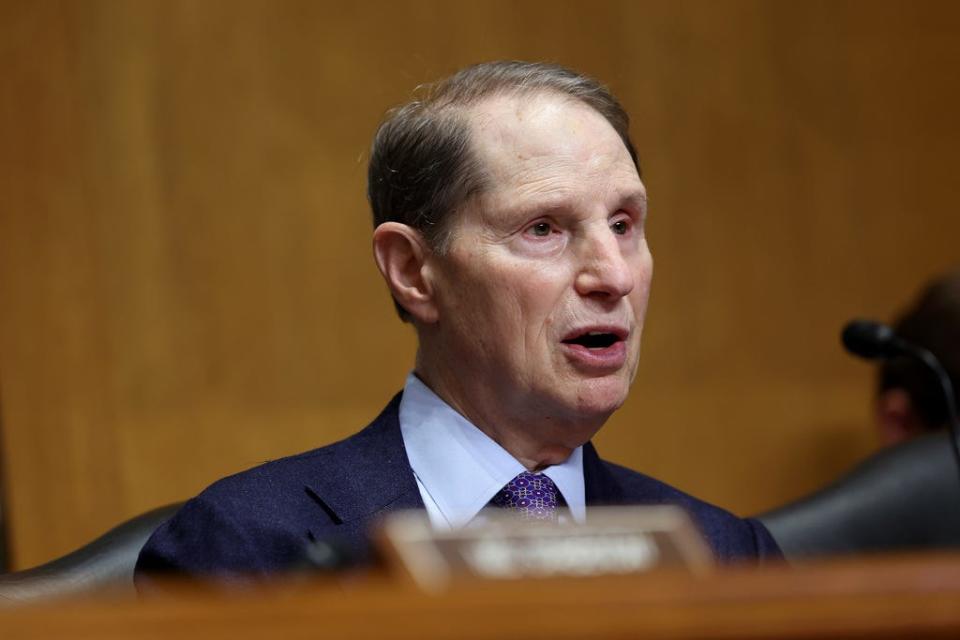Biden said U.S. support for Ukraine won't waver. Congress and voters are having second thoughts.
- Oops!Something went wrong.Please try again later.
- Oops!Something went wrong.Please try again later.
WASHINGTON − After President Joe Biden promised more U.S. military support for Ukraine at a NATO summit in Vilnius, he now needs Congress to put the money where his mouth is.
NATO allies and G7 nations agreed on new long-term security guarantees to Ukraine and assured Kyiv of a path into the military alliance, despite falling short of Ukrainian President Volodymyr Zelenskyy's request for a clear timeline for NATO ascension.
Biden said in a speech from Vilnius that the United States' commitment to Ukraine "will not weaken."
"We will not waver," he said. "We will stand for liberty and freedom today, tomorrow, and for as long as it takes."
Since Russia launched a full-scale invasion of Ukraine on Feb. 24, 2022, the U.S. government has spent more than $100 billion on aid for Kyiv, and although Ukraine is staging a counteroffensive against Russia, there are some signs that part of the American electorate is beginning to waver in its support for backing the Ukrainian war effort. Republican voters, in particular, have become increasingly skeptical of sending more aid overseas, according to a recent poll.
That skepticism is also growing in Congress, where some Republicans are threatening to strip money for Ukraine from a defense spending bill expected to provide Kyiv with crucial billions in additional military assistance. Other lawmakers have advocated for more limitations and called on the Biden administration to ensure oversight on Ukraine aid packages.
Why it matters: Since Russian President Vladimir Putin's escalation last year, the war in Ukraine has become the top U.S. foreign policy issue. Many politicians and experts also believe helping Ukraine to defeat Russia is crucial for American national security and will discourage other countries − such as China − from attempting something similar.

'Tell me how we do well if Putin wins'
Even as opponents of more Ukraine aid are increasingly voicing their disapproval in Congress, proponents are indicating that there still is bipartisan support in Congress to finance the long-term security guarantees for Ukraine that Biden made in Vilnius.
Sen. Lindsey Graham, R-S.C., one of the most vocal Republican supporters of Ukraine in Congress, expressed confidence Tuesday that the House and the Senate would agree on a supplemental spending bill that includes "money for Ukraine" in addition to funding for domestic defense needs and funding to address a global food crisis.
Graham told USA TODAY he intends to persuade Republicans who question the need to continue funding Ukraine by asking a question of his own: "Tell me how we do well if Putin wins?"
That question may go unanswered by some Republicans.
Rep. Dan Bishop, R-N.C., a member of the ultraconservative House Freedom Caucus, told USA TODAY he will not support a Ukraine funding supplemental bill.
"There's been zero accountability, zero strategy and zero plan to end the conflict from the Biden administration," Bishop said. "They want to ratchet up our involvement and make the taxpayers foot the bill.
"It’s alarming, and I don’t see how anyone rational can continue to support this blank-check policy."
Sen. Thom Tillis, R-N.C., said in an interview with USA TODAY that if the U.S. government wants to continue funding Ukraine, "there will be a need for a supplemental."
Tillis said Biden will run out of the money he has used for expedited defense packages to Kyiv and will need Congress to pass a spending bill so the U.S. government can "continue to provide munitions, training" and other support for Ukraine.
Other lawmakers have expressed concern about whether the aid is being used for its intended purposes. Most recently, a group of Republican senators took aim at the Biden administration after the Defense Department announced it had overestimated the value of U.S. security aid to Ukraine by $6.2 billion.
Sen. Josh Hawley, R-Mo., and four other senators wrote in a letter Monday to Defense Secretary Lloyd Austin that the accounting error is a "transparent attempt to bypass Congress for additional funds, while continuing to prioritize Ukraine over more vital U.S. interests, including deterring China in the Pacific."
"This is yet another example of why we do not support further appropriations to Ukraine," the Republican senators said.
Sen. Ron Wyden, D.-Ore., a supporter of additional funding for Ukraine, also told USA TODAY he believes it is important to have oversight.
"We need to be very vigorous to make sure it's spent wisely," he said.

'They just got lucky'
The debate on Capitol Hill mirrors the debate on Main Street, where voters across the country have conflicting views on sending more money to Kyiv − even if they want Ukraine to win the war.
"We're taking this money from Americans that work hard for their money and we're sending it overseas," said Artem Joukov, 32, a recently graduated Ph.D. student and registered Republican from Plano, Texas. "It's wonderful if people want to help out of their own private funds, but to use government funds when we're running a $1.5 trillion deficit per year, I don't think is wise."
Rep. Gerry Connolly, D-Va., said in an interview with USA TODAY that he believes what Putin "has done is crystal-clear in most American minds."
"We're not fighting. The Ukrainians are fighting and dying," Connolly said. "We're supplying them and training them, and I think that is an understandable proposition for most Americans that merits their support."
Yuliya Kindziayeva, 42, a Democrat living in California who is from Belarus, said she wants to see the U.S. government further increase its aid to Ukraine because she believes a Russian victory will result in further invasions.
"If Ukraine doesn't stop Putin, Putin will go further and further into Europe, especially Eastern Europe," she said.
Having grown up in Belarus, Kindziayeva said, she knows what it is like to live under a dictator and said Americans who don't support military aid for Ukraine are taking democracy for granted.
"People who were born and raised here, sometimes they think that they are special and they deserve democracy," Kindziayeva said. "To be honest, they just got lucky.
"But any other country over there also deserves to be free and to be democratic, especially in Eastern Europe," she said. "And sometimes, countries need help."
In conversations with constituents about why Washington should continue to support Ukraine, Wyden has emphasized the national security concerns related to Russia and invoked his own family history as the son of Jewish immigrants who fled the Nazis before World War II.
"I just came off several town hall meetings in rural Oregon, so I was out with voters," Wyden said. "I said, 'Look, my dad fled the Nazis in the 30s, and not all our family got out. We know something about authoritarians, and that's Putin.'"

'We need everybody to do their part'
Other voters are concerned about the U.S. government sending more lethal weapons and military equipment to Ukraine.
"I don't see that it's in America's best interest that we're sending billions of dollars of anything over to Ukraine, much less weapons, munition and now illegal cluster bombs," said Aaron Bennion, 47, an independent voter who lives in Portland, Oregon.
"I would support sending stuff like food, medical supplies, things to support the Ukrainian people themselves," Bennion added.
Biden's controversial decision to supply Ukraine with cluster bombs, which carry an increased risk of causing civilian causalities, has also caused tension with his allies in Congress.
Connolly, a Democratic congressman from Virginia, said he does not support Biden's move to send cluster bombs to Kyiv.
"The very supply and deployment of these weapons guarantees that future generations of Ukrainian children are going to be maimed and killed by unexploded ordnance," Connolly said. "I understand the military imperative that President Biden felt he was faced with, and I know it's a very difficult and painful decision for him, but I come down on the side of opposing the use of cluster bombs."
Joukov, a Republican from Texas, also said it is unfair the American government is spending more on Ukraine than its NATO allies are.
"We're one of many countries in NATO, and yet we bear the brunt of the burden," Joukov said. "If the people that are closer to the crisis are unwilling to spend their own money to fund it, then perhaps the cause is not as just, or as great, or as likely to succeed as we might believe over here."
Getting NATO allies to commit to spending 2% of their GDP on defense is "very related" to shoring up support for additional Ukraine funding in Congress, Connolly said.
"We need everybody to do their part," he said. "When they don't, it erodes confidence in NATO and the alliance itself."
This article originally appeared on USA TODAY: Ukraine aid: Voters, GOP split as Biden promises more support at NATO

